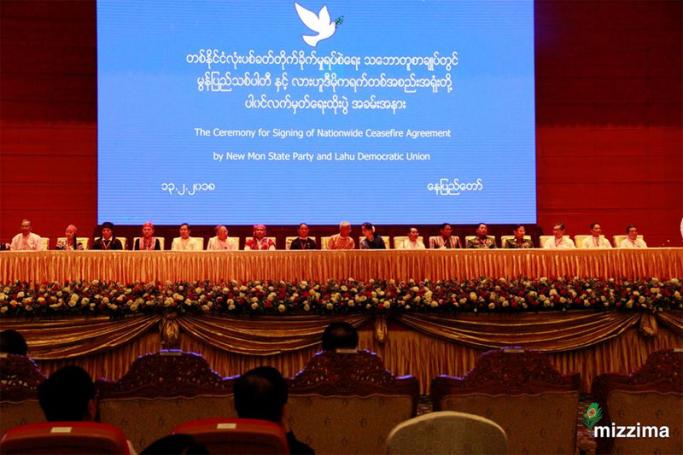Two armed ethnic groups signed a ceasefire in Myanmar on Tuesday in a move which the government hopes will revive a flagging peace process dogged by continuing fighting and widespread distrust of the army.
The New Mon State Party (NMSP) and Lahu Democratic Union (LDU) inked the National Ceasefire Agreement in the capital Naypyidaw, joining eight other militias who had signed before Aung San Suu Kyi took office.
Suu Kyi, whose official title is State Counsellor, made peace her top priority when her civilian administration took office in 2016 to end five decades of military domination.
But there has been little to show for the effort, with swathes of drug-producing ethnic areas still riven by unrest that has displaced tens of thousands.
However Suu Kyi welcomed the national ceasefire agreement at Tuesday's colourful signing ceremony attended by government officials, the army chief and ethnic representatives in traditional clothes. It was the key to unlocking national unity, she said.
She conceded that the "light of peace... cannot cover the whole country", adding "our country is facing a lot of pressure and criticism from the international community.”
Both the European Union and the US embassy in Myanmar welcomed the signing as a step in the right direction.
The EU called for an end to clashes in other conflict-hit regions to make way for more dialogue and for people there to have access to humanitarian aid "without delay".
Tuesday's signatories have not actively clashed with the army for some time but were part of a bloc of powerful rebel armies that resisted signing the ceasefire pact under the former military-backed government.
"We believe in Daw Aung San Suu Kyi but we'll have to see what happens on the road ahead, because the government and the military are not very united," LDU chairman Kya Khun Sar told AFP before the signing.
- Powerful military -
The army no longer rules directly but still controls the key home affairs, borders and defence ministries as well as a quarter of parliamentary seats.
This gives it a full say over security operations around the country, denying Suu Kyi's civilian administration some pivotal powers.
That has sparked scepticism over Suu Kyi's "21st Century Panglong" peace talks, named after the agreement signed by her independence hero father that promised autonomy to major ethnic groups before independence from Britain in 1948.
"Regardless of the theatre and pageantry of the NCA signing for the Mon and Lahu, the peace process is broken and only the state counsellor's office seems unaware of this reality," political analyst David Mathieson told AFP, saying that the military has been the "main actor derailing the peace process".
Mai Win Htoo, a Ta’ang National Party MP, said peace negotiations have yet to bear fruit for his community in the restive northern state of Shan.
"Since it started, there has been more fighting in my area. People have had to run away. They lose their jobs, their homes. It has brought war on our area."
Myanmar's patchwork of ethnic groups make up around a third of the population, but the government and military have long been dominated by the majority Bamar ethnic group to which Suu Kyi belongs.
© AFP
You are viewing the old site.
Please update your bookmark to https://eng.mizzima.com.
Mizzima Weekly Magazine Issue...
14 December 2023
New UK Burma sanctions welcome...
13 December 2023
Spring Revolution Daily News f...
13 December 2023
Spring Revolution Daily News f...
12 December 2023
Spring Revolution Daily News f...
11 December 2023
Spring Revolution Daily News f...
08 December 2023
Spring Revolution Daily News f...
07 December 2023
Diaspora journalists increasin...
07 December 2023
Naungcho to be transformed into tourist destination












